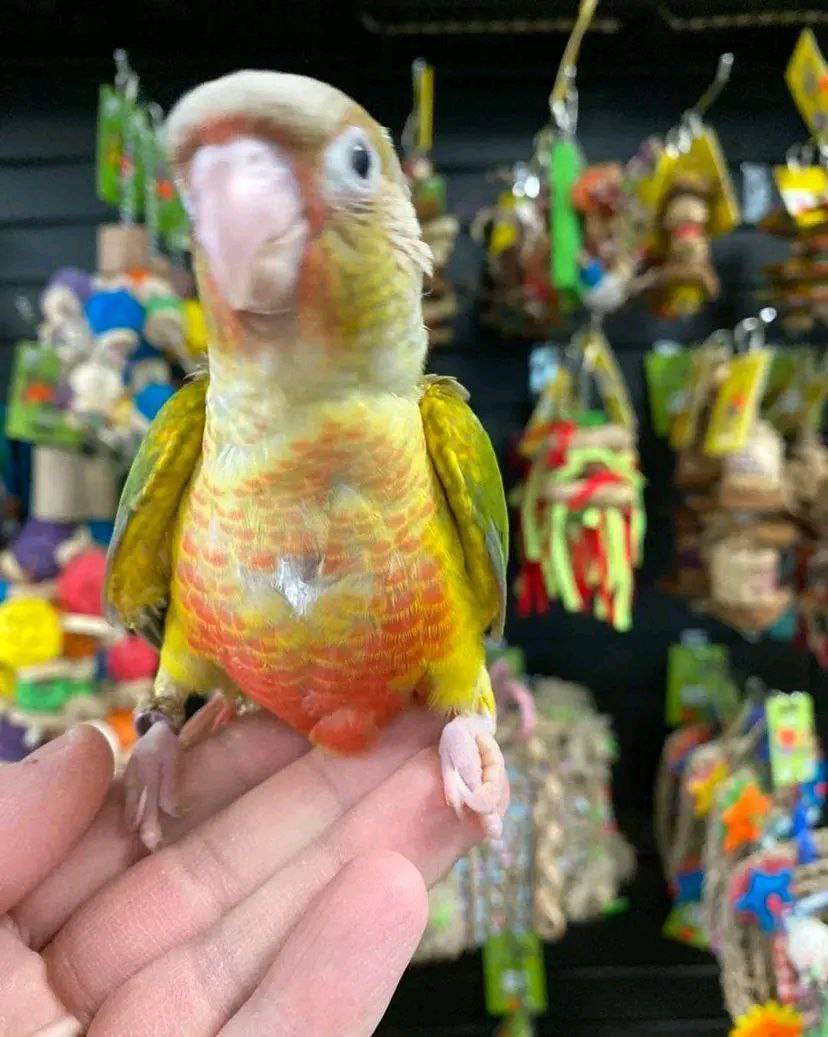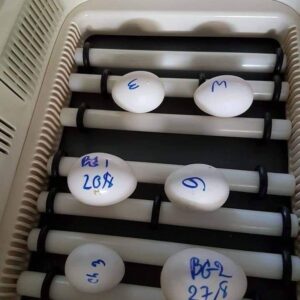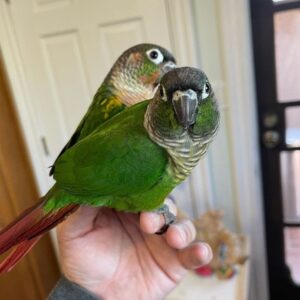Description
Pineapple Green Cheeked Conure for sale or Pineapple Green Cheeked Parakeet (Pyrrhura molinae)
Geography: South America - Brazil, Bolivia, Argentina and Paraguay
Song / Call: Green cheek conures are relatively quiet compared to other conures - not as loud or as frequent in its calling, but it will make some noise. Green-cheeked conures have been known to talk, and some are able to learn quite a few words, but they are generally not prized for their talking abilities.
Size: About 10"
Sexing: Monomorphic (visually hard to determine sex)
Life Span: 25+ Years
Temperament: Green-cheeked Conures are affectionate and not known to be nippy. Because Green-cheeked Conures are highly affectionate and love their owners intensely, they need an owner that is able to give them a great deal of time out of the cage. With the proper care, attention and love, a Pineapple Green Cheek Conure will become your best friend for life.
Breeding: Pineapple Green Cheek Conures are fairly Easy to Breed
Diet: 50% of a Conure's diet should be washed veggies. Also, Lovebird/Conure Seed, Dried Egg Food, Cuttlefish Bone, Australian Blend Goldenfeast, Fruit Pellets, Nuts, and Washed Fresh Fruit.
Veggies: Spinach, Green Beans, Kale, Celery, Peas, Carrots, and Grape Vine Leaves.
Fruits: Apples, Kiwi, Blueberries, Strawberries, Grapes, Bananas, Figs, Mangos, Oranges seem to be the favorite fruits of Pineapple Green Cheek Conures.
Care of Pet Conures
Conure parrots, are delightful little birds that are colorful and full of character. Hand reared conures make excellent pets and are extremely popular with bird lovers all around the world. Some of the more popular, and readily available types of conures kept as pet birds, include the following: Sun Conure, Jenday Conure, Nanday Conure, Blue Crowned Conure, Maroon Bellied Conure, Green Cheeked Conure, Peach Fronted Conure, Dusky Headed Conure, Red Masked Conure, and the Patagonian Conure.
Conure Care
Conures are active birds, and consequently conure bird cages need to be fairly large relative to body size, fitted with lots of toys, especially things to chew, and noisy toys like bells and rattles, to provide stimulation and prevent boredom. As they are intelligent birds that love to interact and play, it is easy to train all types of conures to perform tricks. They will readily lie upside down in the palm of your hand and play dead. They also love water, and it is recommended that a bird bath be provided – alternatively a spray shower in hot weather will always be appreciated.
Conure Diet
A balanced diet of whole grains, fruit, vegetables, seeds and nuts is recommended for all types of conures to ensure that they remain in good health. Feed commercial seed and pellet mixes together with a variety of fresh fruit and vegetables. Conures love apple, corn on the cob, sprouted seeds, as well as a cooked mix of corn and peas, such as the mixes available for pigeons. Foods to avoid include chocolate, alcohol, onions and avocado pear, which is highly toxic to parrots.
Personality & Behavior
Conures can be very playful, very cuddly and, at times, very loud. A conure is more inclined to be curious and bold instead of shy and cautious. Conures are active and busy birds that need plenty of toys and other forms of enrichment to keep them happily occupied throughout the day. A conure can make a great family pet because of its playful and outgoing personality. In a family situation, children should be taught how to respectively interact with the conure, including proper handling and not forcing interaction. A conure loves to be where its people are or on them; even going so far as to climb under their owner’s shirt, head poking out of the collar, during cuddle time. Some conures will dance back and forth, and might even mimic its person’s movements. Conures can also be taught to perform tricks on cue if trained using positive enforcement.
Speech & Sound
A conure’s signature sound is a high-pitched screech, which is often emitted when the bird is excited, startled and/or when it wants attention. Many owners make the mistake of inadvertently reinforcing a conure’s screech by running over to the cage or otherwise giving the bird direct attention whenever it begins to screech. Conures are capable talking and, although their vocabularies are not as extensive as that of other parrot species, they can learn to speak a few words and phrases.
Health & Common Conditions
Conures can be prone to feather picking. If a complete medical exam rules out medical causes of feather plucking, boredom and/or lack of appropriate mental stimulation can be a cause. Offer your conure an enriched environment with plenty of opportunities for play and exercise, as well as a staple supply of safe items to chew. Conures are also susceptible to Proventricular Dilatation Disease (PDD), Psittacine Beak and Feather Disease, Psittacosis, beak malocclusion and Aspergillosis. Regular health checkups by an avian veterinarian are crucial to your conure’s health, as they can help diagnose and treat many disease processes early on.
Experience Level: Intermediate
Expected Size: Conures grow up to 15 inches (38 cm) from head to end of tail.
Lifespan: Conures can live as long as 20 years.
Behavior: Conures have playful personalities and can be noisy.
Temperament: They need at least an hour of daily interaction with their pet parents.



Reviews
There are no reviews yet.